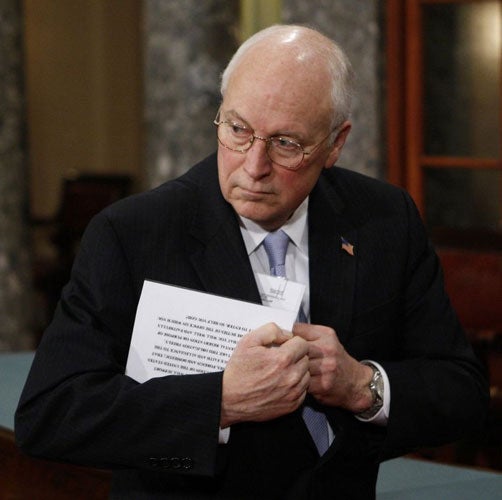Cheney asks: What about CIA's torture triumphs?
US needs 'good, first-rate intelligence' to protect itself argues former vice president

Your support helps us to tell the story
From reproductive rights to climate change to Big Tech, The Independent is on the ground when the story is developing. Whether it's investigating the financials of Elon Musk's pro-Trump PAC or producing our latest documentary, 'The A Word', which shines a light on the American women fighting for reproductive rights, we know how important it is to parse out the facts from the messaging.
At such a critical moment in US history, we need reporters on the ground. Your donation allows us to keep sending journalists to speak to both sides of the story.
The Independent is trusted by Americans across the entire political spectrum. And unlike many other quality news outlets, we choose not to lock Americans out of our reporting and analysis with paywalls. We believe quality journalism should be available to everyone, paid for by those who can afford it.
Your support makes all the difference.Dick Cheney has returned to the fray to demand the CIA release documents that he says show "enhanced" interrogation techniques extracted crucial information from terror suspects.
The former vice president's remarks follow Barack Obama's decision to release top secret memos detailing controversial questioning methods used under the Bush administration.
"One of the things that I find a little bit disturbing about this recent disclosure is that they put out the legal memos... but they didn't put out the memos that show the success of the effort," Mr Cheney told Fox News.
Mr Cheney may have been further disturbed to hear Barack Obama's comments at a press conference yesterday reopening the way for prosecution of senior figures in the Bush administration for authorising torture. While Mr Obama repeated that CIA operatives should not be charged, he added that "With respect to those who formulated those legal decisions" whether to prosecute would be "more of a decision for the attorney general."
The release of four Justice Department memos that described and offered legal justifications for interrogation methods now banned by President Obama has created controversy, both as to the wisdom of the move and to the pledge not to prosecute CIA operatives.
But it is not clear that the White House will quake at the latest assaults from Mr Cheney, not least because his repeated resurfacing as defender-in-chief of the Bush (and Cheney) years is seen by many as a sign of the Republican Party's failure to find new voices to challenge Mr Obama.
Nor is Mr Cheney any more popular these days on the domestic political landscape. A Gallup poll at the end of March said that 63 per cent of Americans had a negative view of him, roughly in line with the country's sentiment towards him for the past three years.
The techniques outlined in the memos include forced nudity, denying suspects solid food, slamming them against specially constructed walls and waterboarding, which simulates drowning.
It emerged this week from the memos that CIA interrogators carried out 266 waterboarding sessions on just two al-Qa'ida terror suspects, both in periods of less than one month. Mr Obama outlawed waterboarding and other 'enhanced' techniques upon taking office.
If Mr Cheney thinks there are documents still classified as secret that will tell his side of the story it seems unlikely this White House will release them.
The US needed "good, first-rate intelligence" in the aftermath of 9/11, Mr Cheney argued, to "prepare and defend against" future threats.
"That's what we did," he said. "And with the intelligence programmes, terror surveillance programmes, as well as the interrogation programme, we set out to collect that type of surveillance." Asked about the outcome of that effort, he added that "it worked".
"There are reports that show specifically what we gained as a result of this activity," he insisted. "I formally ask that they be declassified. I know specifically of reports that lay out what we learned through the interrogation process and what the consequences were for the country."
Mr Cheney launched his attack on the same day that Mr Obama traveled to CIA headquarters in Langley Virginia to boost morale. Acknowledging that the agency had experienced a difficult few days, he said: "Don't be discouraged that we have to acknowledge that potentially we've made some mistakes. The fact that we are willing to acknowledge them and then move forward, that is precisely why I am proud to be President of the United States, and that;s why you should be proud to be members of the CIA."
A quiet retirement? Not for Dick
* The former Veep is back in his home state of Wyoming in theoretical retirement after decades of public service.
* However, in barely 100 days since he and George Bush left the nation's capital, Cheney has availed himself to television interviewers on three separate occasions to vent about what the Obama-Biden team is up to, most memorably accusing it last month of making America "less safe".
* Cheney's gripes with Obama are not the only thing he has talked about. He has also revealed he fought with his old boss, George Bush, in the final days of the last administration over his refusal to give a presidential pardon to his former chief of staff Lewis (Scooter) Libby who was convicted of perjury in the case of the revealed identity of CIA agent Valerie Plame.
* For reasons that aren't clear, he did not attend a Bush reunion party in Texas last week with guests that included Karen Hughes and Condi Rice.
Join our commenting forum
Join thought-provoking conversations, follow other Independent readers and see their replies
Comments